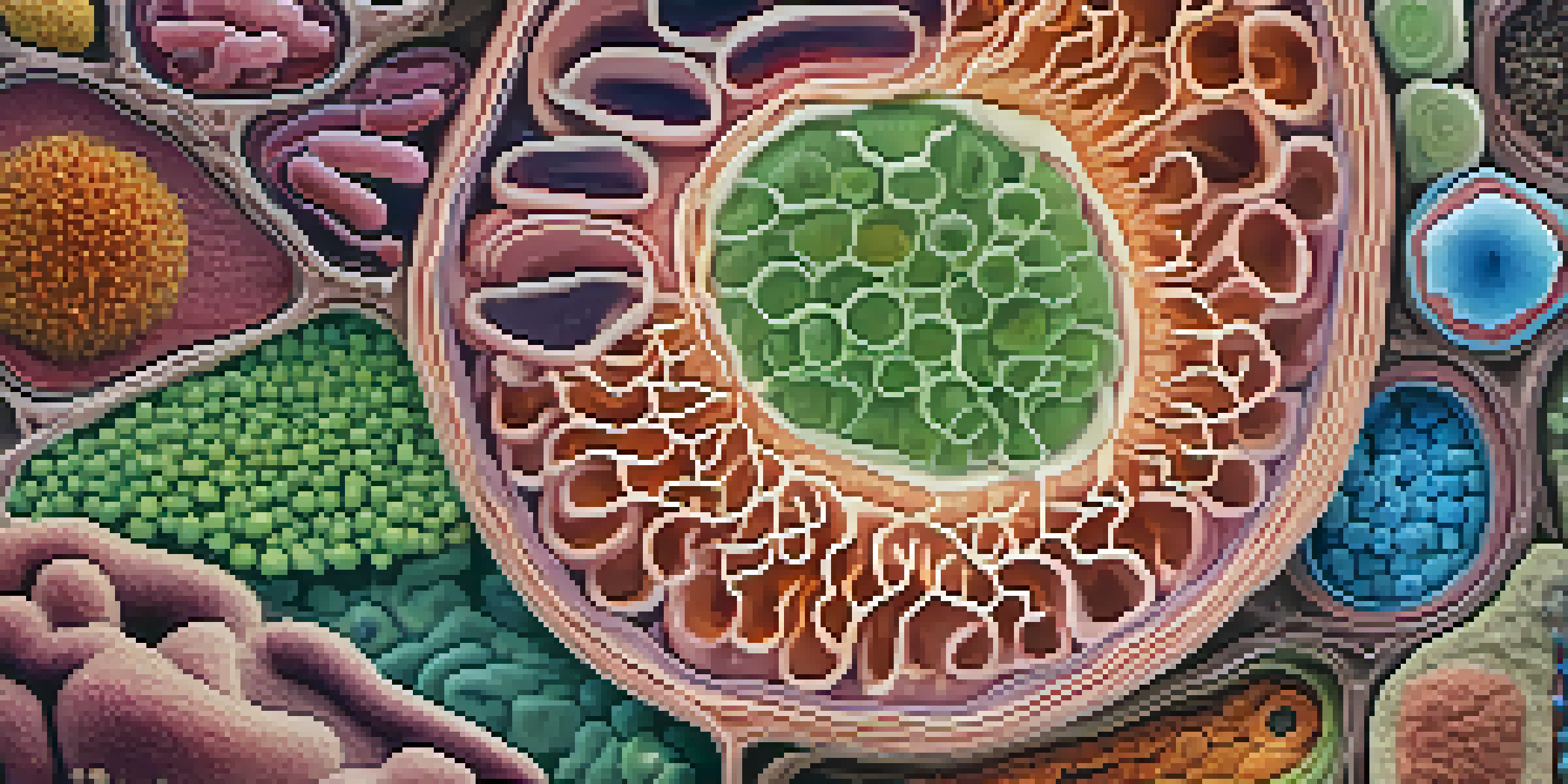Inflammation and Gut Health: Understanding the Link

What is Inflammation and Why Does it Matter?
Inflammation is your body's natural response to injury or infection. Think of it as your body's defense mechanism, akin to a soldier defending a fort. While acute inflammation is essential for healing, chronic inflammation can be harmful and is linked to various health issues.
The gut is a complex and dynamic ecosystem that plays a central role in our overall health and well-being.
Chronic inflammation can occur when the body continues to send out immune cells even when there's no threat. This can lead to a range of problems, including autoimmune diseases and heart issues. Essentially, it's like having a fire alarm that goes off unnecessarily, causing chaos without a real emergency.
Understanding inflammation is crucial because it plays a significant role in gut health. The gut is home to trillions of bacteria, and when inflammation disrupts this balance, it can lead to digestive issues and other health complications.
The Gut: A Complex Ecosystem
The gut is often referred to as the 'second brain' due to its complexity and importance. It houses a diverse range of microorganisms that work together to aid digestion and maintain overall health. Imagine your gut as a bustling city, where each microbe has a specific role to play.

When the gut's ecosystem is in balance, it functions optimally, helping with nutrient absorption and immune function. However, factors like stress, poor diet, and antibiotics can disrupt this balance, leading to dysbiosis, where harmful bacteria outnumber the beneficial ones.
Inflammation: A Double-Edged Sword
While acute inflammation is vital for healing, chronic inflammation can lead to serious health issues.
This imbalance can trigger inflammation, creating a vicious cycle that impacts not only gut health but also the rest of the body. It's essential to keep this ecosystem healthy to prevent inflammation and associated health issues.
How Inflammation Affects Gut Health
Inflammation can lead to conditions like leaky gut syndrome, where the intestinal lining becomes compromised. When this happens, toxins and undigested food particles can enter the bloodstream, leading to systemic inflammation. It's similar to a poorly sealed dam that allows unwanted water to flow into areas it shouldn't.
Chronic inflammation is the root cause of many diseases, and understanding how to combat it is essential for maintaining health.
This leakage can trigger immune responses, further aggravating inflammation and leading to symptoms such as bloating, fatigue, and food sensitivities. It's a cycle of discomfort that can leave you feeling unwell and confused about the root cause of your symptoms.
Moreover, chronic inflammation in the gut can contribute to serious conditions like inflammatory bowel disease (IBD) and irritable bowel syndrome (IBS). Both conditions highlight the importance of addressing inflammation to maintain gut health and overall well-being.
Foods that Promote Gut Health
What you eat plays a significant role in gut health and inflammation levels. Incorporating whole, nutrient-dense foods can help soothe inflammation and support a healthy gut. Think of it as nurturing a garden—nutrient-rich soil leads to flourishing plants.
Foods rich in fiber, such as fruits, vegetables, and whole grains, feed beneficial gut bacteria, promoting a balanced microbiome. Fermented foods like yogurt, sauerkraut, and kimchi are also excellent choices, as they introduce beneficial probiotics into your system.
Gut Health is a Complex Ecosystem
A balanced gut microbiome is essential for overall health, and disruptions can trigger inflammation.
On the other hand, processed foods high in sugar and unhealthy fats can exacerbate inflammation. By choosing the right foods, you can foster a healthier gut environment and combat inflammation effectively.
Lifestyle Changes for Better Gut Health
Beyond diet, lifestyle choices significantly impact gut health and inflammation. Regular physical activity is one of the best ways to reduce inflammation and promote gut health. Think of exercise as a natural fire extinguisher that helps put out the flames of chronic inflammation.
Stress management is equally important. Chronic stress can disrupt gut health and lead to inflammation. Techniques like mindfulness, meditation, and yoga can help you keep stress levels in check, ultimately benefiting your gut.
Sleep is another crucial factor. Lack of sleep can negatively affect gut health and increase inflammation. Prioritizing quality sleep ensures your body can recover and maintain a healthy gut environment.
The Role of Supplements in Gut Health
Supplements can be a helpful addition to your gut health regimen, especially if dietary changes alone aren't enough. Probiotics, for instance, can help restore balance to the gut microbiome. Think of them as reinforcements sent to support your gut army.
Omega-3 fatty acids, found in fish oil, are known for their anti-inflammatory properties. Integrating these into your routine can provide your body with the tools it needs to fight inflammation effectively. It's like giving your body extra armor in the battle against chronic inflammation.
Lifestyle Choices Impact Gut Health
Diet, exercise, and stress management play crucial roles in maintaining gut health and reducing inflammation.
However, it's essential to consult a healthcare professional before starting any supplements. They can guide you towards the right options based on your specific health needs and conditions.
When to Seek Professional Help
While making lifestyle changes can significantly impact gut health, there are times when professional help is necessary. If you experience persistent digestive issues, such as severe bloating, diarrhea, or abdominal pain, it may be time to consult a healthcare provider. Ignoring these symptoms is like ignoring a warning sign on a road—you could end up in a rough situation.
A healthcare professional can help identify underlying issues, such as food intolerances, infections, or chronic conditions. They can also provide tailored advice on managing inflammation and improving gut health.

Early intervention is key. The sooner you address gut health problems, the better your chances of preventing more serious health complications down the line.